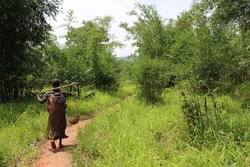Geoform | December 2016
Host country governance and the African land rush: 7 reasons why large-scale farmland investments fail to contribute to sustainable development
by George Schoneveld, CIFOR
Abstract
Host country governance and the African land rush: 7 reasons why large-scale farmland investments fail to contribute to sustainable development
by George Schoneveld, CIFOR
Abstract
The large social and environmental footprint of rising investor demand for Africa’s farmland has in recent years become a much-examined area of enquiry. This has produced a rich body of literature that has generated valuable insights into the underlying drivers, trends, social and environmental impacts, discursive implications, and global governance options. Host country governance dynamics have in contrast remained an unexplored theme, despite its central role in facilitating and legitimizing unsustainable farmland investments. This article contributes to this research gap by synthesizing results and lessons from 38 case studies conducted in Ethiopia, Ghana, Nigeria, and Zambia. It shows how and why large-scale farmland investments are often synonymous with displacement, dispossession, and environmental degradation and, thereby, highlights seven outcome determinants that merit more explicit treatment in academic and policy discourse.













